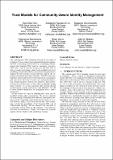| dc.contributor.author | Choi, Hee Chul | en |
| dc.contributor.author | Kruk, Sebastian Ryszard | en |
| dc.contributor.author | Grzonkowski, Slawomir | en |
| dc.contributor.author | Davis, Brian | en |
| dc.contributor.author | Breslin, John | en |
| dc.date.accessioned | 2009-12-10T14:36:45Z | en |
| dc.date.available | 2009-12-10T14:36:45Z | en |
| dc.date.issued | 2006 | en |
| dc.identifier.citation | Hee Chul Choi, Sebastian Ryszard Kruk, Slawomir Grzonkowski, Katarzyna Stankiewicz, Brian Davis, John Breslin "Trust Models for Community Aware Identity Management", Proceedings of the Identity, Reference and Web Workshop, in conjunction with WWW 2006, 2006. | en |
| dc.identifier.uri | http://hdl.handle.net/10379/488 | en |
| dc.description.abstract | The contemporary Web is heading towards its next stage of evolution. From a clump of unorganised information spaces, the Web is becoming more focused on the meaning of information (the Semantic Web) and on community awareness (Web 2.0). One of the key concepts in this new Web is that of social networking, where both sophisticated trust modelling and personal identity/reputation management are required for the creation of social networks and for the exchange of information in these networks. The Web has many instances of sites and services where reputation management and trust form the basis of social and commercial interaction between members of those sites. However, there are few systems that enable users to share their credentials among many websites. It is also important that systems should provide strong security and protect user identities, but all of these features should also be transparent from a user's perspective.
In this article we begin by detailing how trust can be modelled within online communities. We present methods for constructing community-aware identity management systems and for computing trust levels between users of a social network, using a novel trust model that takes advantage of both the capabilities of the Semantic Web and of a distributed topology. We also describe how the trust of a particular person relies on the separate social networks that they are members of. Finally, we evaluate our research against current studies in the psychology domain. | en |
| dc.format | application/pdf | en |
| dc.language.iso | en | en |
| dc.rights | Attribution-NonCommercial-NoDerivs 3.0 Ireland | |
| dc.rights.uri | https://creativecommons.org/licenses/by-nc-nd/3.0/ie/ | |
| dc.subject | Human Factors | en |
| dc.subject | Theory | en |
| dc.subject.lcsh | Online social networks | en |
| dc.subject.lcsh | Human information processing | en |
| dc.subject.lcsh | Computer security | en |
| dc.title | Trust Models for Community Aware Identity Management | en |
| dc.type | Workshop paper | en |
| dc.description.peer-reviewed | peer-reviewed | en |
| dc.contributor.funder | eLite | en |
| dc.contributor.funder | Knowledge Web | en |
| dc.contributor.funder | Science Foundation Ireland | en |
| nui.item.downloads | 2985 | |


